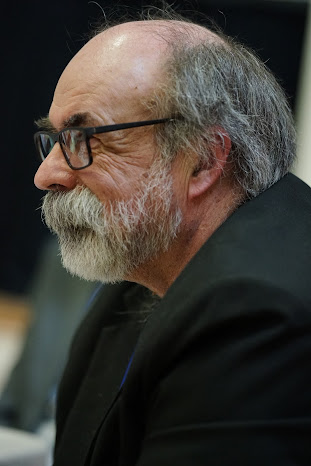How did you first come to poetry? What is it about the form that resonates?
This might seem strange, and it's certainly contra the zeitgeist, but I think I first came to poetry via the Bible. It was the primary reading material in my house when I was a kid, and it has a bit of everything: dragons, giants, list poems, love songs, surreal visions, hookers, miracle cures, shocking violence, unassauged grief. For obvious reasons, it remains one of the foundational texts of western culture. I'm not religious, and I haven't read the Bible for years, but I do think that early reading had a profound and enduring impact. And it is that remarkable carrying capacity that I think is the most resonant feature of poetry for me – it can hold and nurture almost anything, from the minimal to the epic, the abject to the sublime. You can pretty much do anything you want in poetry.
How did publishing your first book change your writing? What have the differences been since?
It's a confidence boost for sure, and while it didn't change how I wrote it certainly provided a kind of permission to continue. That feeling never goes away entirely - it's always a thrill to have a new book out. But you do learn, over the years, not to get too high or too low, but just to continue to do your job as well as you can because it's a job you want, no one else is making you do it.
Things are different, in many ways, than the way they were in 1979, when my first collection came out. With the internet, and the push towards diversity and inclusiveness, the poetry scene today is way more varied and available than it used to be. I mean, there were lots of cool things happening in NYC in the 60s, but I was in small-town Saskatchewan and had no way of hearing about them til long after the fact. I think that left me stubborn, and that's a lineage that can be traced in my work ever since.
How does a poem begin?
With language, always. Ideas, inspiration, rhythm, can come from anywhere, can touch you in a variety of ways and can go in any direction (ie music, for me) but until it gets transformed into language there's no poem. That preliminary step can be triggered by just about anything: a dream, a phrase, an illness, good sex. I'm working on a poem called Kubota because we recently had some foundation work done on our house and the mini-excavator was an orange Kubota with an amazing boom arm.
Have you a daily schedule by which you work, or are you working to fit this in between other activities?
Yes. I write early in the morning, often getting up before 6am. I'm semi-retired now, but even when I worked fulltime (30 years in museums in Alberta and here in Ottawa) I would write for a while before anyone else was up. It's a deeply-engrained habit now and I can't sleep in even when I want to, much to my chagrin. I've raised three kids and have an active family life, and that certainly takes up some time, even now. I make a point of doing other stuff as well. I've created a garden almost everywhere I've lived, and am harvesting the last of this year's produce at the moment. I've played music (piano, guitar, mandolin) most of my life (my mom was a piano teacher), until a recent disability curtailed that. Sometimes I think that those other commitments have interfered with my writing, but mostly I think they enrich it.
What are your favourite print or online literary journals?
I've taken a hankering to that one about strawberries all the time, but there are many that I read and enjoy. I'm pretty much monolingual (my French sucks) but I try to read a lot of work in translation, so Asymptote and Modern Poetry in Translation are always interesting to me. The Yale Review, Conjunctions, Annulet are among the American mags I like and Arc, The Malahat Review, Train and Canthius always get read here. Right now I like the New York Review of Books because it published Ben Lerner's amazing poem 'The Lights' in its July issue.
Who are some of the writers you are reading lately that most excite you?
Jorie Graham's recent work. jittery and breathless, in her Runaway (Ecco) and showing up in various journals even more recently, seems to me the best, most urgent, she's ever done. There a new collection as well, apparently, but I haven't had a chance to read it yet.
rob mclennan's the book of smaller (University of Calgary Press) is one of his most appealing works. A pandemic product, with all of the family working from home, the poems are necessarily short and grounded in domestic routine, even as they remain alert to the wider world. It's an engaging book, and deeply imbued with rob's singular rhythm and tone. Some of his best work.
Also really pleased to see a book, finally, from Anne Marie Todkill. Her Orion Sweeping (Brick), which collects poems that have been appearing sporadically for at least a decade, is sometimes grim, sometimes celebratory, but the language remains precise and unrattled throughout. It's kind of old-school, but it's really good.
